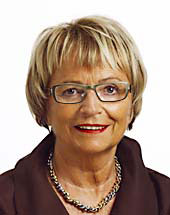Foreword by Doris Pack

Dear readers,
As the Chairwoman of the Committee on Education and Culture of the European Parliament, I am very honoured to once again be asked to write this foreword. The European Cinema Yearbook is an essential reference guide on the current state of the European audiovisual industry.
Over the course of my many years as a Member of the European Parliament I have come to understand that culture is a key, if not the key, to communicating with EU citizens and connecting them together through their shared and diverse cultural heritage - a cultural heritage of which audiovisual media and cinema are essential and integral parts.
I am committed to ensuring both our continued support for European cinema through initiatives such as the LUX Prize and to encouraging new ideas and innovations particularly in the context of the transition to digital technologies.
2011 is an important year for cinema.This year we celebrate the 20th anniversary of the MEDIA Programme, which has been a great success and contributed up to €1.7 billion for investment in EU cinema since its inception.
The MEDIA Programme has had an invaluable impact on EU cinema. I welcome the Commission's stated intention to strengthen the next generation of the programme (2014-2020). The audiovisual sector, and in particular cinema, is not only fundamental to our cultural identities as Europeans, but to the EU as a whole.
The current MEDIA Programme was initiated to tackle new issues arising from the emergence of digital technologies as well as the extension of the European audiovisual market after the latest enlargements. It has made a significant contribution to the increase in circulation of European audiovisual works inside and outside the European Union.
I am confident that the Commission proposal, due to be published in the coming months, will prove equal to the challenge of our heightened expectations.
A number of significant changes have impacted recently on the audiovisual sector and in particular the film sector. The development of digital technologies, and the rapid growth of new types of services such as VoD, has proved an even greater challenge for some countries than we in Europe have faced ourselves.
At the end of the last parliamentary term, a new EU programme, the MEDIA MUNDUS 2011-2013 programme was adopted in order to promote and support audiovisual cooperation with professionals from third countries.With its €15 million budget for 2011-2013, the programme aims to boost the exchange of information between professionals, and improve the competitiveness and transnational distribution of audiovisual works worldwide as well as the circulation and exposure of audiovisual works.
The first MEDIA Mundus projects were officially launched at the Berlinale (61st Berlin International Film Festival), last February. It is hoped that such funding will encourage international co-productions, increase worldwide distribution and make the industry more competitive, offering cinema audiences a more diverse range of content. 34 projects have been selected for support under the programme,helping them to overcome structural difficulties such as under-investment and market fragmentation. A second call for applications for funding was launched this summer.
In March the Commission also launched a public consultation on the next generation of the programme after 2013, which I hope will build on the vital contribution it has already made.
As I mentioned earlier, the European Parliament's LUX Prize is a concrete symbol of its support for the European film industry. It has become a benchmark of quality for European film productions with several past winners enjoying commercial and critical success both within the EU and beyond. Awarded annually since 2007, it seeks to promote the rich diversity of European cinematography stemming from our different cultures whilst at the same time highlighting our shared values and experiences.
The LUX Prize specifically addresses the issue of the language barrier. The award is worth approximately €90,000 which is used for the subtitling of the winning film into each of the EU's official languages.
The 2010 Prize was awarded to Die Fremde (“When we leave”) written, directed and produced by Feo Aladag, the first woman to compete for the Prize. It is the story of a young Turkish woman’s struggle to adapt and to build a life in Germany away from the cultural norms of her community.
In 2011, the LUX Prize aims to take this goal a step further with screenings of all three shortlisted films in the capitals of the 27 Member States.
Many more challenges as well as opportunities are yet to come, and the EU should not miss this chance to reinforce what it has done in the last two decades. With the right structures in place I believe that, as Wim Wenders has said, European cinema can do for Europe what Hollywood did for the United States and create a ‘European dream’ uniting Europeans in their cultural diversity allowing those outside the EU to learn more about our rich and diverse traditions.
Doris Pack
Chairwoman of the Committee on Education and Culture of the European Parliament